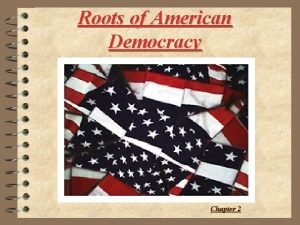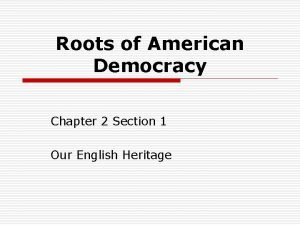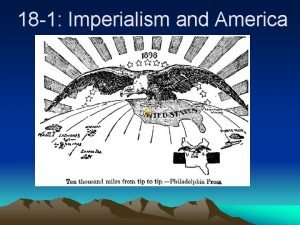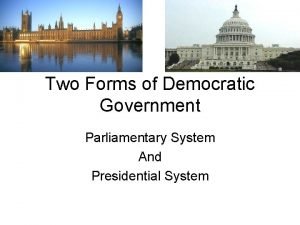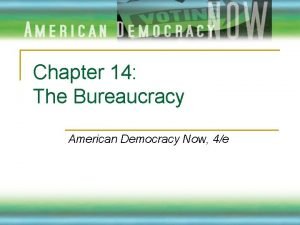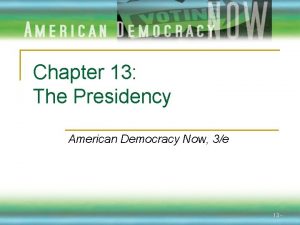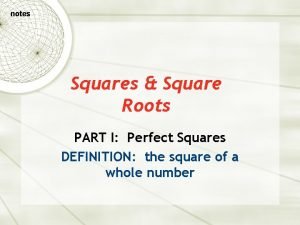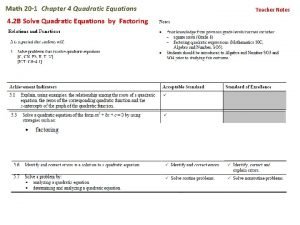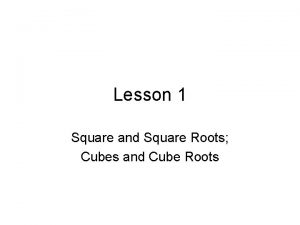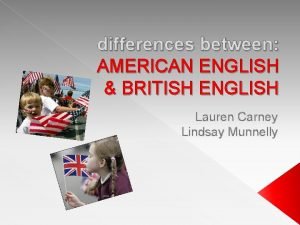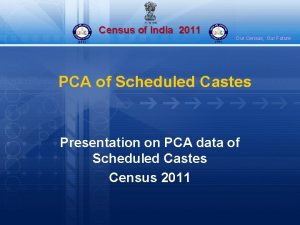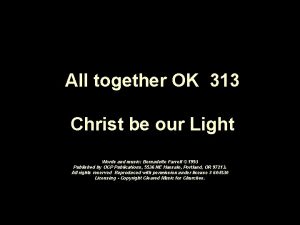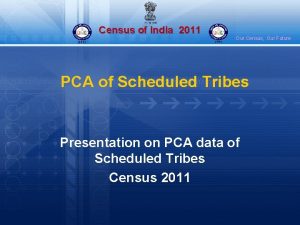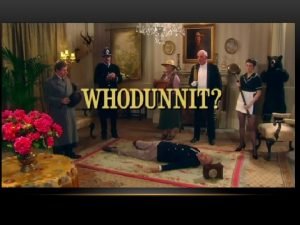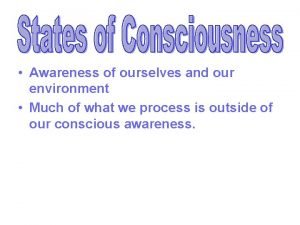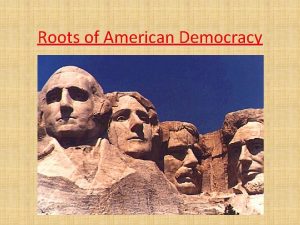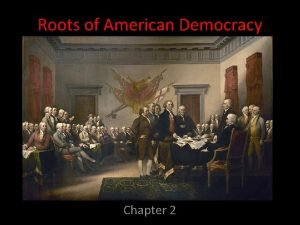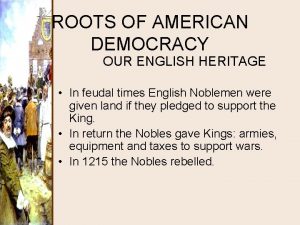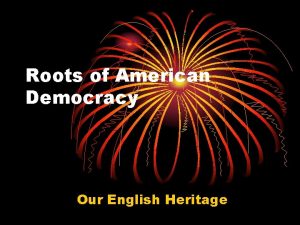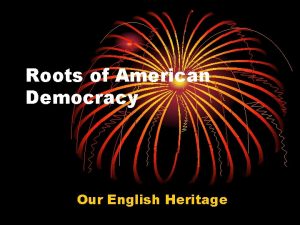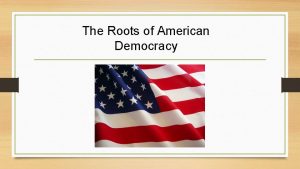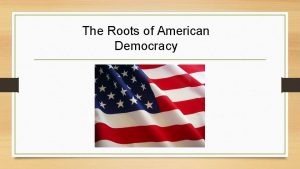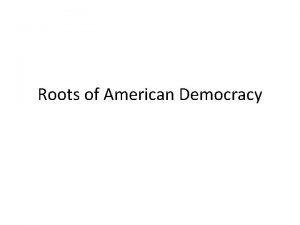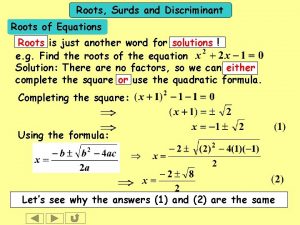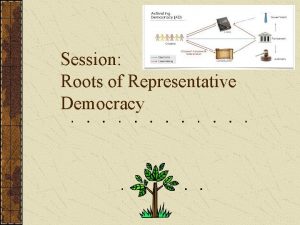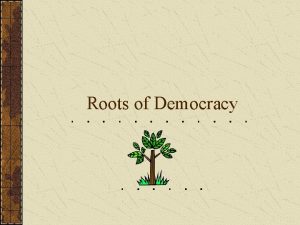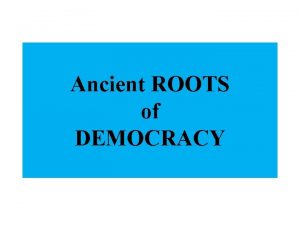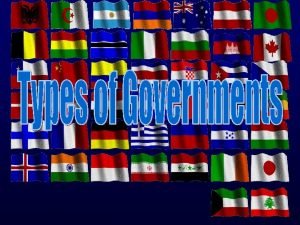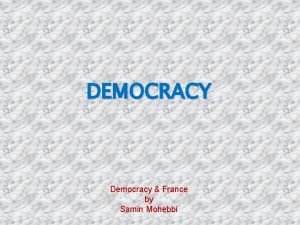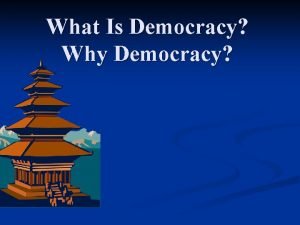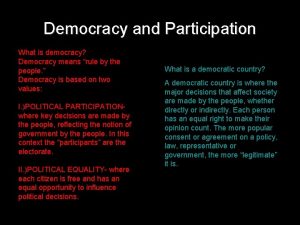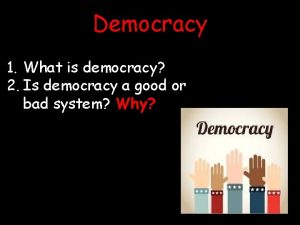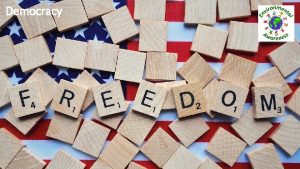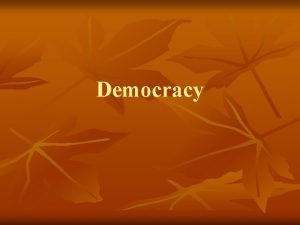Roots of American Democracy Chapter 2 Our English



























- Slides: 27

Roots of American Democracy Chapter 2

Our English Heritage King John made large grants of land to “nobles” in exchange for their loyalty. In 1215 the nobles rebelled forcing the King to sign an agreement. The “Magna Carta” said that even the King must obey the law.

The Development of Parliament King Henry III met regularly with the nobles to get their advice as to how to rule the country. These early “talks” developed until the “Parliament” began making laws for the day to day work of governing the country.

The Development of Parliament began as a single group but split into two parts. Upper House (House of Lords) – the group of nobles who had once advised the King Lower House (House of Commons) – made up of representatives of towns and counties.

The Glorious Revolution In 1688 Parliament removed King James II from power and gave his throne to William and Mary. This showed that Parliament was stronger than the King. From here on, Parliaments power would come from English citizens.

Unwritten Constitution Although there were such documents as the Magna Carta and the English Bill of Rights that helped shape English government, there simply is no document that lays out the British way of government in any kind of master plan.

Common Law Precedent – a ruling in an earlier case that is similar Over time a system of courts developed and Judges would look at how those previous cases had been decided. This system of law based on ‘Precedent”, is known as Common Law.

American Common Law Today, American laws that deal with property, contracts and personal injury, are based on English common law.

American Common Law (2) An English citizen’s rights: 1) The nation’s ruler is not above the law. 2) The People should have a say in government 3) The basic rights of the citizen is protected by law. 4) These ideas were brought to this country when English colonies were established.

The Colonial Experience Colony - a group of people in one place who are ruled by people in another place. Since Parliament was 3, 000 miles away from the new colonies, the colonists had to find a way to govern themselves.

The House of Burgesses The first permanent English settlement founded in North America was Jamestown dealt with their problems by having each town send representatives to meet and find answers. This body of representatives was called the “House of Burgesses”.

The Mayflower Compact A new group of colonists came ashore a few hundred miles north of Jamestown and built a settlement called Plymouth. Before they stepped on land, the settlers drew up a plan of government for the new colony. Compact – an agreement or contract. Town Meetings – local citizens gather to discuss and vote on issues.

English Colonial Governments Although there were many differences in the governments of the 13 colonies, there were also many similarities. 1) Each colony had a governor. Some were elected and some were appointed by the English King. 2) Each colony had a legislature, many of which were modeled after Parliament

New Sense of Identity Although the colonists were officially “English”, they began to think of themselves as Americans. At first England left the colonists alone. Later England’s financial problems caused the colonies to be seen as a source of revenue.

Toward Independence Mercantilism - theory that a country should sell more goods to other countries than it buys. For this theory to be able to make England wealthy. It needed a source for raw materials. That source would be the new colonies in the new world.

British Taxes Britain had fought a long and expensive war with France. War costs money, and to pay for the debt it had gone into, Britain began to levy taxes on the colonists. The colonists resented these British taxes.

British Taxes (2) Boycott- to refuse to buy certain goods. Repeal – to cancel After colonists refused to pay taxes and boycotted British goods, Parliament passed the “intolerable” acts which restricted some rights of the colonists.

The First Continental Congress Delegates representatives Congress – a formal meeting of delegates to discuss items of common concern. 12 colonists sent delegates to Philadelphia to discuss how to fight the intolerable acts. Independence – selfreliance and freedom from outside control.

The First Continental Congress (2) During the seven weeks that the meeting lasted, the delegates sent a letter to King George III demanding that the rights of colonists be restored. The colonists vowed to hold another meeting the next year if King George did not meet their demands.

The Second Continental Congress Since the King had refused to restore the colonists rights, the Congress formed a committee to write a document formally announcing American independence.

The Declaration of Independence Although Thomas Jefferson is given credit for most of the writing of the Declaration of Independence, all of it’s ideas were not his. Rousseau – all men are equal Locke – all people have natural rights, governments are based on a social contract.

The Nations First Government’s The Declaration of Independence did not declare that America would be a single country. Each colony, now called states, felt that they had little in common with any of the other colonies. However, a few Americans favored a large central government.

Early State Constitutions After the Declaration of Independence, each state wrote it’s own detailed constitution. These state constitutions were similar to their colonial governments. All had governors and legislatures and many had “Bills of Rights” listing citizen rights such as trial by jury and protection of personal property.

Confederation With the shooting war already starting, the Second Continental Congress made plans for a “firm league of friendship” among the states. This would be the Articles of Confederation.

The Articles of Confederation Since the colonies had experienced strong central government (the King) and did not like it, the Articles of Confederation did not allow the Congress to tax the colonies or enforce it’s laws.

Weaknesses of the Articles Ratified – approved Amend – change Congress could not pass any laws unless 9 states voted in favor of it. To change the constitution, (amend it), approval was required of all 13 states. That was almost an impossibility.

Shays’s Rebellion Daniel Shays was a farmer who had fallen into debt because of heavy state taxes. Courts were threatening to take many farms from farmers. Shays led 1, 200 farmers to take the federal arsenal at Springfield. They were unsuccessful yet it sent a clear message that change was needed.
 Chapter 2 roots of american democracy answers
Chapter 2 roots of american democracy answers Chapter 2 roots of american democracy answers
Chapter 2 roots of american democracy answers The roots of american imperialism economic roots
The roots of american imperialism economic roots Parliamentary government
Parliamentary government American democracy now chapter 14
American democracy now chapter 14 American democracy now chapter 13
American democracy now chapter 13 Vanessa jason
Vanessa jason Square roots and cube roots guided notes
Square roots and cube roots guided notes Existence and uniqueness of square roots and cube roots
Existence and uniqueness of square roots and cube roots Quadratic equations roots
Quadratic equations roots Perfect squares list
Perfect squares list Motorway in american english
Motorway in american english British english
British english British english vs american english
British english vs american english Roots of american imperialism
Roots of american imperialism Thinking affects our language which then affects our
Thinking affects our language which then affects our Our census our future
Our census our future Christ be our light bernadette farrell
Christ be our light bernadette farrell Our life is what our thoughts make it
Our life is what our thoughts make it We bow our hearts we bend our knees
We bow our hearts we bend our knees Our census our future
Our census our future Our life is what our thoughts make it
Our life is what our thoughts make it Money madness meaning
Money madness meaning Our awareness of ourselves and our environment
Our awareness of ourselves and our environment Awareness of ourselves and our environment is:
Awareness of ourselves and our environment is: God our father christ our brother
God our father christ our brother Our future is in our hands quotes
Our future is in our hands quotes Our awareness of ourselves and our environment
Our awareness of ourselves and our environment
